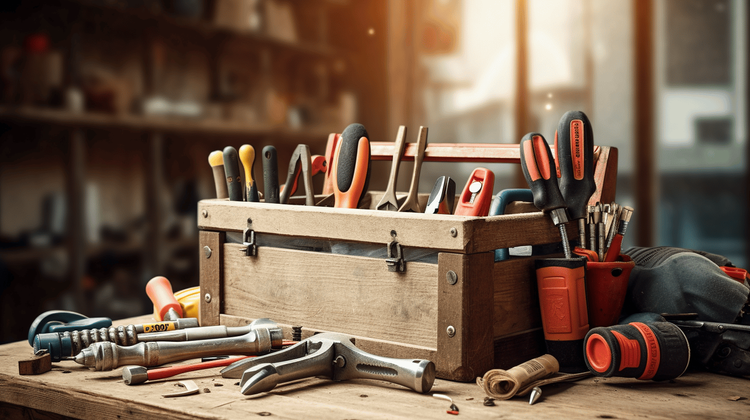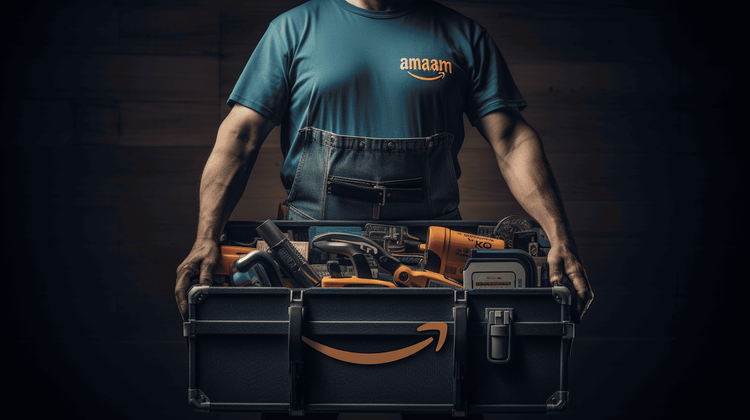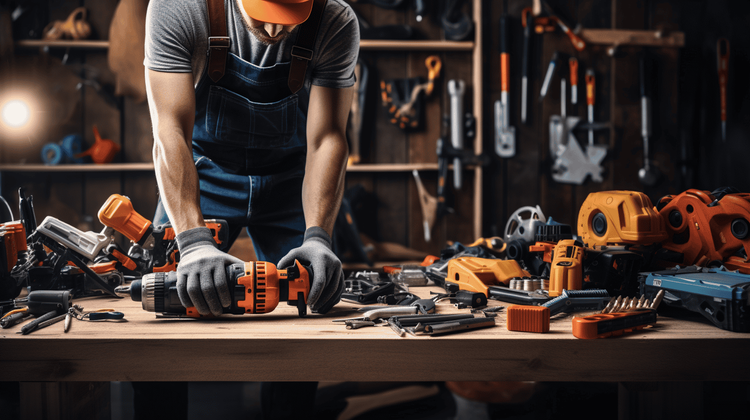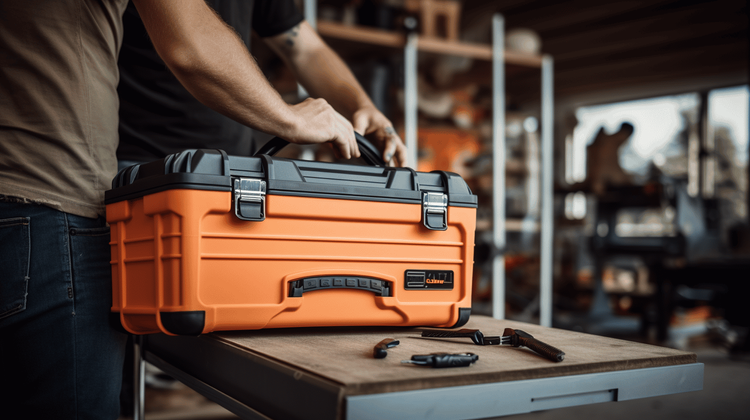Money-Saving Tips for Buying DIY Tools
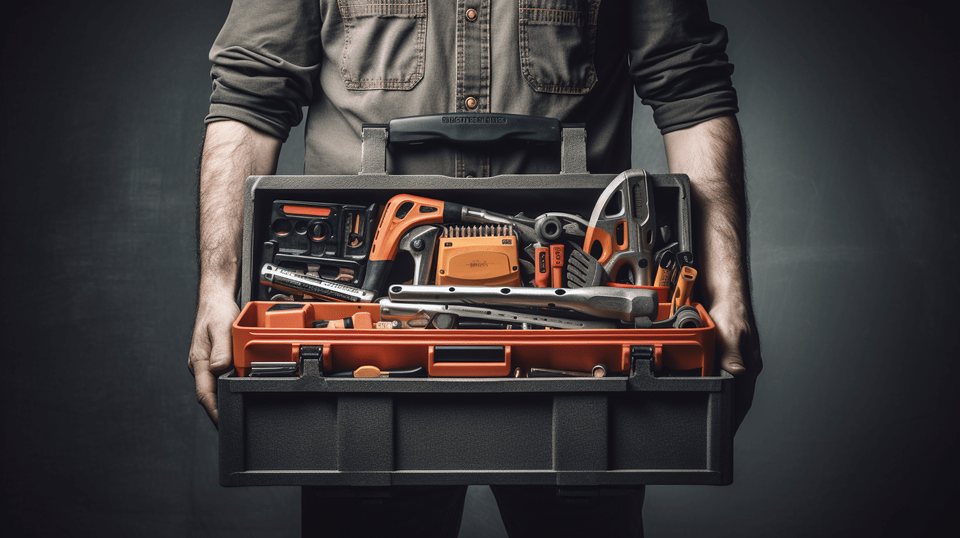
Picture this: It's a sunny Sunday afternoon, and you're mentally preparing to transform that outdated living space into a dazzling, Pinterest-worthy marvel. You're excited and have gallons of motivation, but there's just one problem—you don't have the right DIY tools for the job. Sounds familiar, doesn't it? 😰
We get it, darling DIY enthusiasts. We understand how frustrating it can be when your ambition exceeds your tools' capacity. And let's face it, those shiny, sophisticated DIY tools displayed on the shelves of your local hardware store can burn a hole in your pocket. But don't toss away those home-improvement dreams just yet, we've got you covered!
Don't worry, every problem presents a solution. This article aims to equip you with practical money-saving tips for buying DIY tools, without compromising on quality. By the end of this guide, we hope to make your DIY journey a smooth and enjoyable one. So bear with us, as we embark on this helpful exploration together. Stay tuned, because some brilliant tips and eye-opening insights are up ahead! 💡🛠️🌈
Understanding the Basics of DIY Tools
Are you ready to roll up your sleeves and jump into the world of DIY? It's a place brimming with creativity, ingenious hacks, and the sweet triumph of building something with your own hands!👷♀️ The right set of tools is crucial to tackle any DIY project effectively. So let's delve into the basics of DIY tools and equip you with necessary knowledge for your crafting ventures.
Essential Tool Types for DIY Projects
Whether you're a DIY newbie or a seasoned veteran, there are some tools you simply can't do without. For starters, hand tools like hammers, screwdrivers, and pliers offer an excellent way to gain control over your tasks and navigate through finer details.✏️🔩🔧 Power tools such as drills, circular saws, and electric sanders often amp up the productivity, enabling you to breeze through large projects swiftly. And then there are fasteners - screws, nails, and bolts; while seemingly small, they play a massive role in holding your project together.
Here's a quick list for you:
- Hand Tools - Hammer, Screwdriver, Plier, Wrench
- Power Tools - Drill, Circular Saw, Electric Sander
- Fasteners - Screws, Nails, Bolts
By managing to grab hold of these basics, you'd already be halfway through equipping your DIY toolkit.
Selecting the Right Tools for Your Project
It's essential to choose the right tool for the right job, as forcing a tool to perform a job it's not designed for could lead to poor results or even damage. 🛠 It's like trying to hammer a screw into place - it just doesn't work well! 🙈 What's important here is understanding the scope and requirements of your project. If you're planning to build a bookshelf, you'll likely need clamps for holding pieces together during the gluing process, apart from the classic hammer and nails.
Keep in mind that every project is unique, and the tools you need will largely depend on the type of project you are undertaking. Remember, a well-thought-out tool choice not only results in a flawless finish but also keeps your passion for DIY in high spirits.
The Importance of Quality in DIY Tools
While DIY is often seen as a way to save money, it doesn't mean you should compromise on the quality of your tools. High-quality tools are designed to withstand the demands of multiple projects and provide you with superior performance. They tend to be more ergonomic and durable, ultimately making your DIY journey more enjoyable and efficient.
So, delight in the thrill of the build and the satisfaction in the creation of something uniquely yours, one tool at a time. Don't forget to respect your tools and they, in return, will fuel your DIY spirit. 🚀💪 Go on, the world of DIY awaits you!
Practical Money-Saving Tips for Buying DIY Tools
Saving money on tools for your do-it-yourself (DIY) projects doesn't necessarily mean skimping on quality. With a few smart strategies and a little bit of know-how, you can stock up your toolbox without digging too deep into your pockets. So how exactly can you save those precious pennies when shopping for DIY tools? Let's dive right in.
Shopping During Sales and Discounts
Look out for those bright red signs in stores or online that say "Sale" or "Discounts"! 🎁 Retailers often offer special deals on tools during major holidays, end-season sales, or clearance events. It's a great opportunity to grab high-quality tools at a fraction of their original price. Plus, who doesn't love a good bargain?
Investing in Multipurpose Tools
Why buy five tools when one can do the job? Investing in multipurpose tools like a 5-in-1 painter's tool or a multipurpose oscillating tool can save you a lot of money in the long run. These all-in-one gadgets can perform a range of tasks, eliminating the need to buy several single-purpose tools.
Buying Second-Hand Tools
Just like with cars, some tools are perfectly good to buy second-hand. You can find gently used tools in great condition at yard sales, flea markets, or online marketplaces. Not every tool in your toolbox needs to be brand new, and buying second-hand can lead to substantial savings.
Renting Tools Instead of Buying
Consider renting tools for those occasional, one-off DIY projects. If you're never going to use that tile cutter or wallpaper steamer again, it might be more cost-effective to just rent it for a day. Many home improvement stores offer tool rentals for a reasonable fee, and it's worth exploring this option.
Maintaining Your Tools Properly
One of the most effective ways to save money is to take good care of the tools you already own. The better you maintain your tools, the longer they'll last, and you won't need to replace them as often. Regular cleaning, proper storage, and correct usage can significantly extend the lifespan of your DIY tools.
Taking a smart approach to buying DIY tools can lead you towards savings you never anticipated. Remember, it's not about owning the most tools, but rather about owning the right tools, and taking good care of them. So the next time you're gearing up for a DIY project, keep these money-saving tips in mind! 🛠️💡
Avoiding Common Pitfalls When Buying DIY Tools
Let's be honest, if you've ever found yourself in the abundant aisles of your local DIY store, mesmerized by a plethora of shiny new tools, you're not alone 🙋♂️🙋♀️. However, buying impulsively is the first common misstep people make when purchasing DIY tools. Luckily, we're here to help you avoid the common pitfalls tied to the task.
Avoiding Impulsive Purchases
Aside from draining your money, impulsive purchases often lead to a shed full of unused tools collecting dust bunnies 🐰💨. It's crucial, therefore, to resist the urge to buy tools you don't need. Instead, focus on what's necessary for your project. For instance, a good quality drill 🪛 is arguably more useful than a specialized, single-purpose tool. Prioritize versatility and function over novelty and hype.
Here are some tips to help you adopt a more mindful approach to shopping:
- Make a list of tools you'll need for your project ahead of time.
- Stick to your budget no matter how tempting the deals might be.
- Avoid bulk purchases unless you know all the tools will be used regularly.
- Delay your purchase by a few days to ensure it isn't a spur-of-the-moment decision.
Researching Product Reviews and Ratings
The digital age has graced us with the power of knowledge in the palm of our hands 📲. Don't neglect the incredible resource of online reviews and ratings before making your purchase. These can give you detailed insights into tool performance, reliability, and value for money.
A rule of thumb is to not solely rely on the brand's own rating system. Find objective third-party reviews on platforms or forums dedicated to DIYers. Remember, the collective voice of those who have used the tool can often outweigh glitzy advertisements.
Understanding the Warranty and Service Policy
One often overlooked aspect when buying DIY tools is understanding the warranty and service policies. This works as a safety net in case things go wrong after the purchase. You'd be surprised to know the number of buyers who regret not spending some time understanding these policies 🙈.
Here's why you must pay attention to the fine print:
- It acts as insurance for your investment, covering repairs or replacements.
- It's an indicator of the manufacturer's confidence in the product.
- Warranty details can also hint at the expected lifespan of the tool.
To sum it up, chisel out some time in your shopping process to understand the warranty and service policy. It might seem tedious at first, but remember, buying DIY tools is an investment both in your workshop and your skillset 🏠🛠️.
With these points in mind, you're on your way to making savvy choices and avoiding common pitfalls when buying your shiny new DIY tools. Happy shopping!
Creating a Budget for Your DIY Tools
Whether you're a seasoned DIY enthusiast or a newbie just dipping their toes into the world of home improvement 🛠️, having the right tools is a must. However, the costs can quickly spiral out of control if you're not careful. That's where budgeting comes in. Crafting a well-planned budget for your DIY tools can help you stay financially healthy while ensuring you have everything you need for your projects.
So you might be wondering, "how on earth do I budget for DIY tools?" 😓 Not to worry, we've got your back with a few practical steps to make your DIY journey smoother 👇.
Understand your DIY needs:
- Are you a serious DIY enthusiast or just a weekend warrior?
- What kind of projects are you planning?
While the first category might require a more extensive toolset, the latter can often get by with more basic tools.
Do your research:
Research on the possible tools you'd need. Save everything in a wishlist and find out the costs of each. This research will help you understand the potential budget you're looking at. Keep in mind that it's always better to purchase high-quality tools that will last rather than cheaper options that will require replacement after a few uses.
Second-hand tools can be a lifesaver:
Don't be afraid of second-hand tools. Sites like eBay, Gumtree, and Facebook Marketplace offer reliable tools in good condition at a fraction of the cost of new ones.
Avoid impulsive purchases:
We all hate that feeling of buyer's remorse when we realize we've bought something on impulse. Prepare a list 📝 before stepping into a hardware store to avoid impulsive purchases.
Planning ahead and being strategic with your tool purchases not only saves you money 💰 but also ensures that you have the right tools for every job, which improves the quality of your work. Make your budgeting part of your DIY project, just like sanding, painting, or hammering, to make your DIY journey successful! 🌟
Remember, budgeting for your DIY tools doesn't mean you need to compromise on quality. It's about making smart choices and using your money wisely. So go ahead, equip your toolbox without blowing your budget! 🙌.
Where to Find Affordable DIY Tools Online
Finding high-quality yet affordable DIY tools can seem like a gargantuan task. After all, everyone loves the dream of creating their masterpieces or fixing things around the home, but such tasks usually require well-made tools that don't have to cost an arm and a leg, right? Fear not, dear reader! The internet is teeming with online marketplaces and specialized websites loaded with affordable DIY tools sure to fit your budget. Now, let's get down to business, shall we?
Reliable Online Marketplaces
First things first, online marketplaces are your go-to platforms when hunting for affordable DIY tools. Here are some platforms that consistently deliver excellent deals:
- Amazon: 🛍️ With a diverse range of products, Amazon’s large selection of tools caters to all your DIY needs. Whether you're working on a small repair job in your house or a significant home renovation project, you will find just the tools you need at competitive prices.
- eBay: 👍 eBay offers new and used items, so it's a good place to score some deals. Just ensure to check seller ratings and reviews before making a purchase.
- Craigslist: 🔄 This platform thrives on local trading. You could find a neighbor selling the exact power drill you were looking for at a fraction of the cost in-store.
Remember to compare prices across these platforms to ensure you get the best deal.
Bargain Hunting on Specific Sites
For the more discerning tool-hunters, there are specific websites dedicated to providing quality DIY tools at incredibly low prices. Here are a few you might want to bookmark for your next tool-hunt:
- Harbor Freight: A fantastic destination for bargain hunters looking for power tools, hand tools, and even tool storage.
- Home Depot: They offer daily Special Buy deals in addition to their already competitive prices, so you'll never miss a chance to save big on your DIY investments.
- Lowe’s: Another home improvement heavyweight, Lowe’s holds regular sales events where you can get tools at reduced prices.
You see, finding affordable DIY tools online doesn't have to be an overwhelming ordeal. By knowing where to look, you can stock up on a treasure trove of tools that won't break the bank, and still let you bring your DIY dreams to life. Now that's quite a deal, isn't it? 🙌
Now go forth, dear reader, and let your inner handyman (or woman) run wild with the best DIY tools, at prices that’ll have you smiling all the way to your workbench.
Conclusion
Unlocking your potential as a do-it-yourself enthusiast or even as a professional in physical jobs doesn't have to break the bank, especially with these helpful tips and tricks. And yet, finding the right balance of quality and affordability in your pursuit of the perfect toolset is a subtle art. Above all, remember that the longevity of the tools, their usefulness and your ability to get good value out of them is more important than saving a few dollars at the outset.
And for your organizational needs, the Bit Holder Keychain from Ultra Handy is an absolute must-have. Designed for easy storage and convenience when handling varied screwdriver bits, this is one purchase you'd never regret. Remember, investing in tools that support your productivity and health is never an expense, but rather, a wise investment in your future. After all, the right tools in the right hands can create extraordinary things.
Remember to stay safe, stay creative, and most importantly, stay Ultra Handy!🛠️💡
Frequently Asked Questions
- What are some money-saving tips for buying DIY tools?Here are some money-saving tips for buying DIY tools: 1. Research and compare prices from different stores and online retailers. 2. Look for sales, discounts, and clearance offers. 3. Consider buying used tools from reputable sources. 4. Buy tool bundles or sets instead of individual tools. 5. Read reviews and make sure the tools are durable and of good quality.
- Is it worth buying used DIY tools?Yes, buying used DIY tools can be a cost-effective option if you are careful about the condition and quality of the tools. Make sure to buy from reputable sources, inspect the tools thoroughly before purchasing, and test them if possible. Buying used tools can save you money without compromising on performance.
- Should I prioritize price over quality when buying DIY tools?While it's important to find tools within your budget, quality should not be compromised. Invest in tools that are durable and made of high-quality materials, as they will last longer and provide better performance. It's better to spend a little more on good quality tools that will save you money in the long run.
- Are online discounts and deals reliable for buying DIY tools?Online discounts and deals can be reliable for buying DIY tools if you purchase from reputable websites and sellers. Read customer reviews, check the seller's ratings and return policies, and ensure that the website uses secure payment methods. Be cautious of deals that seem too good to be true, as they may indicate low-quality or counterfeit products.
- Can I borrow DIY tools instead of buying them to save money?Yes, borrowing DIY tools from friends, family, or neighbors can be a great way to save money, especially for tools that you may only need for a one-time project. Just make sure to take good care of the borrowed tools and return them promptly. Additionally, consider joining a tool library or renting tools when needed.
